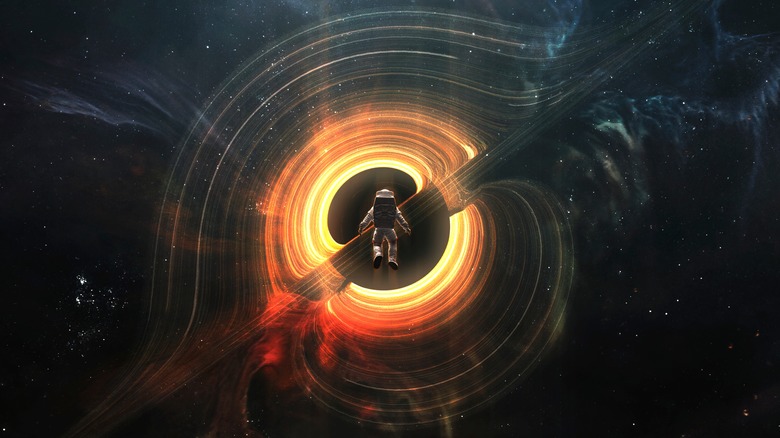Is Time Travel Actually Possible?
We all know how time travel works, right? You step into a gyroscopic chamber in a secret science research facility, a dude in a white lab coat hits a switch, the chamber spins and makes "bwa wa wa" sounds as arcs of blue "energy" crackle around, and snap: You're face-to-face with Arnold Schwarzenegger circa 200 million B.C.E. for a mission to shoot up dinosaurs with robo gun arms. Pew-pew!
Well, it's time to dash to pieces all of our beloved, sci-fi-conjured time travel visions from "Star Trek," "Back to the Future," "Avengers: Endgame," "The Terminator," and even classy, supposedly more grounded fare like "Interstellar." No, you won't be going back in time to chat up Julius Caesar in English, sire your own grandfather, or save humanity with the power of semi-clever plot contrivances. And yet, sites like Scientific American say that time travel is possible. What gives?
When physicists say that "time travel is possible," they mean that time passes differently for different observers based on speed and distance — i.e., "time is relative," ala Albert Einstein's famed E = mc2 theory of special relativity. They also mean that "there's nothing mathematically preventing time from moving in reverse." But we experience time unidirectionally because molecules tend to move from higher to lower states of order, as Quanta Magazine outlines — i.e., "Time's Arrow." Putting these two together means: 1) No one refutes that forward-moving time travel is possible, and, 2) Backward-moving time travel is impossible.
Space, not time
It sounds like a perfectly typical, baseless, first-year philosophy student proclamation: "You see — time ... doesn't exist!" Cue the smoke bomb and rapturous facial expression. Well, it's time to blow everyone's minds and confirm that, yeah, that statement is kinda-sorta true. Except, it's only true because time isn't time. Time is space, which means time travel is really space travel.
In his 1905 theory of special relativity, Albert Einstein noted that as objects approach the speed of light, they experience time more slowly. As Live Science overviews, this is referred to as "time dilation." But to that fast-moving object, everyone else is slow. Hence: Time is relative and not the same for all observers.
Four years later in 1909, German mathematician Hermann Minkowski coined the term "space-time" to refer to the unified spatial and temporal nature of reality. Time, he concluded, is just another aspect — a dimension — of space. You can move through space at the expense of time, or vice-versa, like how you can turn right at the expense of turning left, per Big Think. To the perspective of light particles — the massless, fastest objects in the universe — time doesn't exist, as Forbes explains.
So, if you want to time travel? You've got to travel through space at near-lightspeed. And as the rest of reality zips by, you slow down. Presto: You're in the future. But you can't go back, as Live Science details. Past physical space no longer exists.
Forward, not backward
"You can never go home again," the somewhat cryptic statement goes. But while that statement refers to an inability to recapture the magical fancies of youth, it could also just as easily refer to time travel.
"Why can't you travel backward in time?" the somewhat consternated headline on Ars Technica asks. Well, because the past doesn't exist in any physical sense with which we could ever interact. It's a psychological construct composed of memories that don't live outside of your head — sorry. The only place the "past" exists is in the far reaches of telescopic sight, like when the James Webb Space Telescope sees light from the early universe that's just reaching us now. In that moment, we're viewing the remote past.
When considering why we can't travel backward in time, we really have to ask, "Why can't molecules spontaneously rearrange themselves into former compositions?" If that happened, then a cracked egg would reform, or spilled milk would slide back up into a glass. But as the second law of thermodynamics says, entropy in a closed system must always increase. Entropy is the tendency for the arrangement of molecules to grow evermore disordered over time, and the universe is a closed system because nothing exists outside of it. And as Popular Mechanics overviews, entropy has continued to increase since the formation of the cosmos. There's simply no way to slip into any previous molecular arrangement, because remember: Time isn't time. Time is space.
Hitching on a ride with the black hole express
There's one viable time travel method on which physicists can agree: Hitching a ride with a black hole. Or more specifically: Moving past its outer, spinning accretion disc and toward the central event horizon from which nothing can escape. As described by Royal Museums Greenwich, this process will most certainly kill you by "spaghettifying" your body. So once again, we're talking about a one-way trip.
Remember we said that as you approach the speed of light, time dilates, i.e., slows down? Well, black holes spin at near-light speed. This is something that one movie — "Interstellar" — got right. But no, you won't get sucked into a 4D library to push some books off of Murph's bookshelf (it's complicated — watch the movie). As Astronomy says, a person stuck in the event horizon of a black hole would observe the rest of the universe aging much faster. That person, strictly speaking, would be in "the future." Now, if we could escape from a black hole? We'd have a workable solution for future-bound time travel.
And yet, as The Conversation reports, some researchers believe black holes can do the impossible: Send someone backward in time. If a celestial object was so massive that it "dragged" spacetime with it, it could create a closed timelike curve (CTC) that could pull someone into "the past." Still, folks like renowned physicist Stephen Hawking thought this was nonsense.
Feasibly impossible
There are a couple of other weird addendums to the "Is time travel possible?" discussion. Chiefly, as physicist Sabine Hossenfelder says on her YouTube channel: "You need a receiver station for time travel." This is something fictional time travel always leaves out and gets wrong. Earth isn't sitting in space like a stone on the ground. As Scientific American says, it's rotating at about 1,000 miles per hour while revolving around the sun at 67,000 miles per hour. On top of this, our entire solar system is spinning through the Milky Way at 490,000 miles per hour. So if you time traveled just one second forward or backward, but didn't account for planetary motion? You'd teleport right into empty space. And so, like we've said: Time travel is space travel.
And finally, there's quantum entanglement: That thing that you've heard about that no one understands. Quanta Magazine explains how quantum entanglement — the codependence of molecular attributes over distances — gives rise to time's arrow. We'll save you the headache by saying: If it was possible to manipulate the attributes of individual atoms, we could reconstruct "the past." This, however, is whackadoodle fantasy absurdity that necessitates digging into further and further realms of unfounded speculation.
So, is time travel possible? Mathematically, yes. Forward, yes. Backward, no. But is it feasible? Let's put it this way: Best focus on the present, because by the time humanity untangles time travel, our present will be nothing but the memory of entropy's future.




